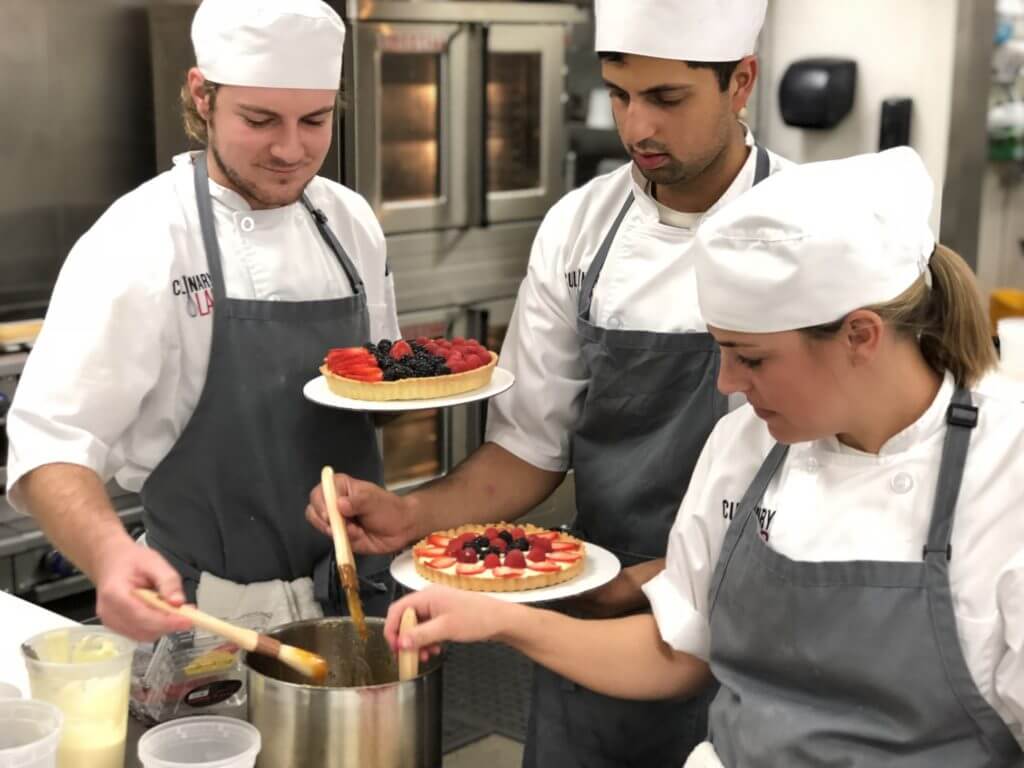Celebrity Chefs
10 Chef Certifications to Advance Your Culinary Career

A chef is a culinary professional with specialized training in a particular area of cooking. Because there are so many styles of cooking, many chefs pursue certification in their specialties to receive additional training and to advance their careers. If you’re a chef and are interested in working in a specific type of kitchen or with a certain type of food, you might consider earning a specialty certification. In this article, we consider why someone might pursue chef certification and explore a list of 10 culinary certifications that can be beneficial for your career.
Why pursue a chef certification?
One of the most common reasons to pursue a chef certification is to advance your career, as having a specialty or advanced credential can help you qualify for higher-level job opportunities. Another reason to work toward a chef certification is to learn more about how to engage in leadership roles in the culinary arts, such as overseeing a kitchen or leading the culinary department in a hotel or hospital. You might also earn one to learn a new technical culinary skill or style of cooking.
10 chef certifications
Here are 10 certifications that you can pursue to advance your career as a chef:
1. Certified Foodservice Professional
One of the most common certifications for chefs to pursue is the Certified Foodservice Professional (CFSP) credential offered by the North American Association of Food Equipment Manufacturers (NAFEM). This certification can be important because it verifies candidates as being familiar with industry standards regarding food service and preparation, which is crucial for ensuring food safety. To earn this certification, candidates typically need to complete 35 credits of foodservice experience, submit the required evidence materials and pass an online exam. The NAFEM also provides study materials that candidates can access online to help them prepare for the exam.
2. Master Certified Food Executive
The Master Certified Food Executive (MCFE) credential from the International Food Service Executives Association (IFSEA) is another popular certification for chefs. This certification is an advanced-level credential, which means that it can show employers that a candidate has high-level expertise in their field outside of preparing and serving food. When preparing for this certification, chefs can study subjects like customer service, food service management and storage that can help them improve their industry knowledge. When pursuing this credential, candidates can pay a fee and pass an online exam to receive their certifications.
3. Certified Chef de Cuisine
The Certified Chef de Cuisine (CCC) credential is another advanced certification for chefs. This certification is designed for chefs who work in leadership positions where they supervise at least two other kitchen staff members during food preparation. The American Culinary Federation (ACF), which is the institution that offers this credential, requires candidates who pursue it to complete a certain number of continuing education hours depending on their formal education level and the years of experience they have. They also mandate three courses, which are Nutrition, Food Safety & Sanitation and Supervisory Management.
After completing these courses and fulfilling the experience requirements, candidates can pay a fee and complete a written exam and a practical exam to earn the credential. CCC certification also needs renewal every five years, which candidates can fulfill by completing more continuing education hours.
4. Certified Personal Chef
A popular certification for chefs who work for private clients is the Certified Personal Chef (CPC) credential from the United States Personal Chef Association (USPCA). Chefs can apply for this credential when they have at least two years of experience as a personal chef, where their job duties included preparing food, purchasing ingredients and serving at special events. This certification can be very valuable for personal chefs, as it can verify to potential clients that they’re experienced in serving clients and taking part in administrative aspects of working independently, such as financial management and marketing for their services.
5. Certified Executive Chef
Another chef certification from the American Culinary Federation is the Certified Executive Chef (CEC) credential. This certification is typically meant for chefs who also work as the heads of their departments, usually in an institution like a restaurant, hospital or hotel. To qualify for the CEC credential, chefs first have to have experience supervising at least five full-time employees while preparing food. They also complete a certain number of continuing education hours according to their level of formal education. Before taking the written and practical exams, candidates also typically need to complete the following courses from the ACF:
-
Nutrition
-
Food Safety & Sanitation
-
Supervisory Management
-
Beverage Management
-
Cost Control Management
6. Certified Master Chef
The Certified Master Chef (CMC) credential from the American Culinary Federation is one of the highest level certifications that a chef can pursue. Having this credential can show employers that a chef has exceptional knowledge of culinary arts and advanced skills in different cooking techniques. Because the credential is so advanced, there are a few more requirements for applying than some of the ACF’s other certifications. Here are the requirements for earning the CMC certification:
-
Certified Executive Chef (CEC) certification from the ACF
-
Wine course (30 hours)
-
Human Resource Management course (30 hours)
-
Advanced Sanitation course (30 hours)
-
Cost Control Management course (30 hours)
-
Letter of financial support
-
Letter of support from a current CMC
-
Passing grade on the certification exam
7. Certified Working Pastry Chef
A popular specialty certification for chefs is the Certified Working Pastry Chef (CWPC) credential from the ACF. As pastry chefs typically have extensive training in pastry techniques, having this credential can verify their abilities to employers. This certification can also highlight a candidate’s leadership skills, as they usually need to have experience supervising at least two people during food preparation before they can apply. Here are a few other requirements that candidates can fulfill before earning CWPC certification:
-
Five years of entry-level pastry experience
-
Nutrition course (30 hours)
-
Food Safety & Sanitation course (30 hours)
-
Supervisory Management course (30 hours)
8. Certified Sous Chef
The Certified Sous Chef (CSC) certification from the ACF is for chefs with advanced expertise in the culinary arts and experience supervising other employees in food preparation. This credential can be especially beneficial for chefs who work in restaurants that use multiple shifts of employees throughout the day, as the certification caters to professionals who oversee a particular shift or station within a culinary institution. To earn this credential, candidates first complete a certain number of years of professional experience, depending on their formal education level. Then, they can apply for the written and practical exams after completing the following ACF courses:
-
Nutrition course (30 hours)
-
Food Safety & Sanitation course (30 hours)
-
Supervisory Management course (30 hours)
9. Certified Decorator
The Certified Decorator credential is for chefs who work in commercial bakeries and decorate baked goods, such as cakes, cookies and pastries. Chefs can earn this certification from the Retail Bakers of America (RBA). To qualify for the Certified Decorator certification, candidates first need four years of experience working in a bakery. Then, they can submit an application and pass an online exam and a practical exam to receive their credential. When earning this certification, candidates can review skills like preparing different types of icing, design techniques and ways to create specialty displays using confections.
10. Certified Culinary Educator
Another certification that the American Culinary Federation offers is the Certified Culinary Educator Credential (CCE). This certification provides advanced accreditation to culinary professionals who work as instructors in culinary arts, typically at culinary schools or other vocational schools. Some areas of study that candidates can explore when earning this certification include administration, performance evaluation and the maintenance of curricula that focus on culinary arts and foodservice management. Candidates can earn this credential by completing an associate degree in culinary arts or a bachelor’s degree in any subject and completing at least 120 hours of education development in the following areas:
-
Curriculum Planning and Development
-
Educational Psychology
-
Teaching Methodology
-
Evaluation and Testing
The ACF also requires candidates to take Nutrition, Food Safety & Sanitation and Supervisory Management courses and have at least two years of experience in the hospitality industry.

Chef Certifications
